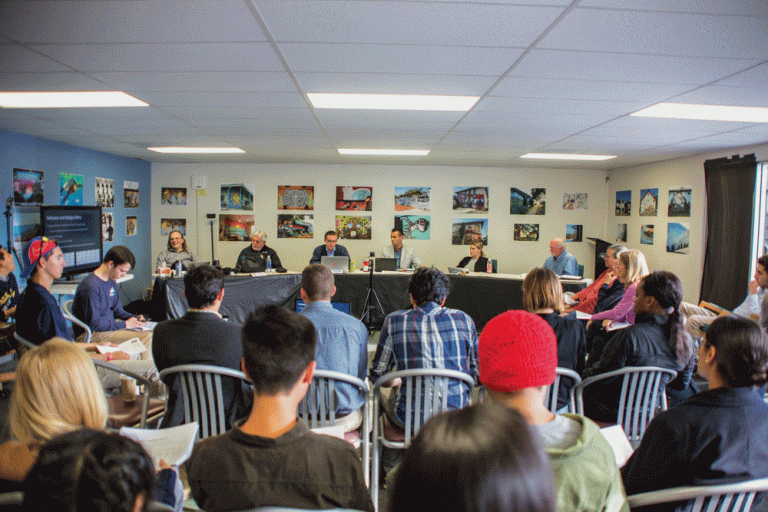
Shomik Mukherjee
News Editor
Students and Isla Vista residents raised alarm about safety in I.V. at the May 30 I.V. Community Services District meeting, following a reported increase in sexual assaults in the area. Many spoke up about their own unsafe experiences in I.V., positing that dangerous incidents in the neighborhood often go unnoticed.
CSD Directors framed the biweekly meeting as a Public Safety Town Hall, encouraging those who attended to speak out about their experiences and pose potential solutions. The public raised issues familiar to I.V., like sexual assault prevention and police transparency.
The town hall was planned and widely publicized after the Santa Barbara County Sheriff’s Department last month released its 2016 crime report, which listed a total of 56 reported sexual assaults for the year — 23 of which counted as forcible rape cases. 2015’s crime report, by contrast, showed 40 sexual assault reports, 13 of them forcible rape cases.
Third year biology major Kian Maalizadeh spoke at public comment, alleging that a month ago he encountered an individual at a party who he heard was “groping girls.” He said the man, when confronted, elbowed Maalizadeh and brandished a knife at him. The man was arrested, Maalizadeh said, but the next day his friend saw the man walking around freely. Maalizadeh further alleged he never received an e-mail or letter regarding the incident.
I.V. local Derek Hayes spoke passionately about his own experience as a survivor of the 2014 Isla Vista shooting tragedy. Hayes said that the perpetrator’s violent tendencies could have been predicted and noted that students needed to take their safety into their own hands on the tragic night.
“We are unwilling to connect as a community,” Hayes said. He also said that certain communities in I.V. are forgotten.
“If you are a certain phenotype in I.V., they don’t care what you have to say,” he said.
Second year history of public policy major Daniel Torres spoke of a perceived “smugness” in police officers patrolling the neighborhood. He turned attention to I.V. Foot Patrol Lt. Ruben Cintron, with regard to police transparency.
“There are always several sides of a story,” Cintron told The Bottom Line after the Town Hall. “We’ll sit there and listen to them. If there’s something we can do better, we’d love to hear it.”
At the meeting, Cintron noted that violent crime in I.V. isn’t often perpetrated by students or locals, but rather by out-of-towners. He cited the recent robbery-and-stabbing on Pardall Road, as well as the alleged hate crime against an LGBTQ-identifying I.V. resident in April. Cintron said that in both instances, the alleged assailants were not residents of I.V.
Despite the largely negative experiences that attendees had to share, the tone of the town hall was mostly productive. Multiple speakers praised the Student Neighborhood Assistance Program, which arranges for students to act as first responders to local noise complaints. Multiple students identified Greek life at UCSB as a “resource” for communication of safety practices to students.
CSD President Ethan Bertrand moderated public comments. Afterwards, he shared his notes on potential solutions that he had heard, including an improved crime report system, a foundation of “looking out” for those under the influence of alcohol and drugs, and “better follow-up for victims who come in contact with law enforcement.”
Fourth year Ro’shawndra Earvin spoke to close the town hall. Earvin had told the CSD, at its first ever meeting, that she had been raped in January and subsequently had negative encounters with the Sheriff’s Department. Speaking at the town hall, she emphasized the need for discussion between cops and the community.
“Communication could have canceled out a lot of the stresses that I had to go through,” she said, “or that other people had to go through.”
Jackie Caldwell contributed reporting to this article.










